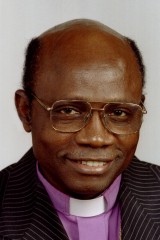
|
||||||||
| United Methodist Bishop Leads Hearings in Sierra Leone | |||
|
The Sierra Leone Truth and Reconciliation Commission, led by a United Methodist bishop, began public hearings April 14 in Freetown to address the wounds of that West African country's civil war. Created by the 1999 Lome Peace Agreement and established by an act of parliament in February 2000, the commission's mandate is to create an impartial historical record of human rights violations and abuses during the 1991-99 armed conflict in Sierra Leone. The goals of the hearings, which continue until mid-July, are similar to that mandate, according to United Methodist Bishop Joseph C. Humper, who serves as commission chairperson. During an April 9 media briefing, Humper explained the commission hopes "to provide witnesses with an opportunity to tell their stories either publicly or in private and help relieve their grief through providing them a platform that validates their experience and offers official acknowledgment of the wrongs done to them." Humper added that the hearings also will "create an opportunity for the country to be engaged in a dialogue with itself about what went wrong and what needs to change." Besides listening to individual witnesses, the commission will hold three other types of hearings. "Thematic hearings" are designed to produce a social analysis in addressing patterns of abuse. With "event-specific hearings," the commission will attempt to determine "whether particular events served an especially catalytic role" in human rights abuses. "Institutional hearings" will be used to consider whether specific civil or state institutions warranted scrutiny for their role "in inflicting, legitimizing or ignoring abuses." Humper explained that closed hearings might be used as the commission responds to the part of its mandate requiring it to learn about the experiences of women and children, particularly in cases of sexual violence, the testimony of a child or when testimony may jeopardize the witness's reintegration into the community. The bishop said the Truth and Reconciliation Commission "has a clear understanding of the enormity of the task that lies ahead with regard to the public hearings." He noted the commission had recently hosted Alex Boraine, former deputy chairperson of the South African Truth and Reconciliation Commission, for a four-day experience-sharing session. The commission also has reached agreement with the United Nations Fund for Women for a three-day, gender-based training event for members and staff. The president of Sierra Leone appointed all seven of the commission's members, three of whom are from outside the country. Besides Humper, the Sierra Leone members are Justice Laura Marcus-Jones, vice chairperson, Professor John Kamara and Sylvanus Torto. Other members are Professor William A. Schabas of Canada, Santang Ajaaratou Jow of the Gambia and Yasmin Louisa Sook of South Africa. At the end of last year, more than 70 people
were recruited and trained to take statements of witnesses from
various parts of the country. Thousands of statements already have
been collected. About 50,000 people died in the conflict, which
also left many others maimed or mutilated. |
|
||
 |
Last
Updated
February 2, 2005


